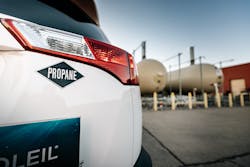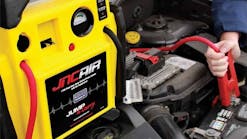Guest Blog: Three ways propane maintenance can improve your budget and downtime
Editor's Note: This article was orginally published Oct, 30, 2019. Some of the information may no longer be relevant, so please use it at your discretion.
According to a fleet diesel particulate filter (DPF) maintenance awareness study published in the September 2019 issue of Fleet Maintenance, more than 87 percent of fleet owners did not know the approximate annual cost to clean DPFs for their entire fleet. Plus, more than 75 percent of fleet owners surveyed said the average downtime for DPF-related repairs was at least one full day. The most common problems fleets reported with their DPFs included face plugging, filter overloading, and thermal cracking.
This survey proves there’s quite a bit of misinformation and an overall lack of awareness among fleet owners about the solutions that are available today to solve most, if not all, of these problems, including switching to a clean-burning alternative fuel like propane autogas.
Not only does propane autogas provide a cleaner emissions profile than diesel, but it also has the lowest total cost-of-ownership of any fuel, in part because of its reliable performance and low costs for fuel, infrastructure, and maintenance.
No added fluids or filters
While diesel emissions technology across the market is required for vehicles to meet more stringent emissions standards, what is often overlooked are the added costs and inconveniences that are required for the new diesel technology — everything from the purchase, storage, and maintenance required for the additional fluids and filters. Diesel emissions fluid (DEF) and DPFs, are expensive added costs for a fleet.
Diesel vehicles require expensive DPFs for final-stage regeneration of emissions before they exit the tailpipe. However, these filters have a finite capacity and require regular cleaning in order to remove particulate matter and ash that can clog the catalyst. Failure to properly maintain DPFs will lead to an even more expensive cleaning or filter replacement repairs.
On top of the added cost, DEF is required to reduce emissions to compliant levels and ensure the diesel engine operates correctly. DEF requires constant monitoring by the driver to ensure proper levels are maintained. Failure to do so will negatively affect vehicle performance, increase downtime, and require unexpected repairs. The costs associated with taking the vehicle out of service to complete these repairs will negatively impact the bottom line.
Because propane autogas is a clean fuel, its emissions systems are much less complex and don’t require additional fluids or filters to ensure performance and meet emissions standards. Propane autogas eliminates the inflated costs for increased maintenance and the worries for fleet owners' service technicians.
Maintain productivity with propane
Based on the results of that same maintenance survey, there is a huge variance regarding when fleets are cleaning or replacing their DPFs, with 68 percent cleaning annually, 13 percent once every six months, 9 percent reporting once a quarter, and another 9 percent more frequently than that. According to manufacturers, DPFs should be cleaned every 200,000 miles. Fleets that are cleaning their DPFs more often face exorbitant costs to do so — whether through a mechanic or with a DPF cleaning machine which can cost tens of thousands of dollars. Not to mention, these vehicles are frequently taken out of service for mandatory maintenance, increasing a fleet’s downtime and decreasing its productivity.
With propane autogas, fleets can eliminate all concerns about the unexpected downtime, cost, or maintenance schedule of DPFs. Because propane autogas burns clean, it doesn’t corrode engine parts or require additional filtration and emissions systems.
Costly preventative winter maintenance not needed
Winter is quickly approaching in most regions of the country and fleets should have completed a review of their cold-weather maintenance and operations plans. It’s a proven fact that colder conditions can affect the performance of diesel engines. Not only are fuel conditioners required to prevent fuel gelling, but fleets must also purchase engine block heaters and employ early start crews in most parts of the country. Even with these cold-weather preventative measures in place, there’s still no assurance the vehicle will start when needed. Propane autogas does not require fuel conditioners or engine block heaters to operate reliably in cold weather, so cold starts are no problem, making winters less of a headache — not to mention more affordable — for the fleet.
Maintenance costs and downtime play a huge role in determining the success of any fleet, and fleet owners need to be able to confidently establish schedules and budgets without worrying about the added hidden costs of unexpected maintenance. For these reasons, more and more fleets are converting to and realizing cost savings and clean, reliable performance with propane autogas.
Information provided by Propane Education & Research Council
Michael Taylor is the director of autogas business development for the Propane Education & Research Council. He can be reached at [email protected].


